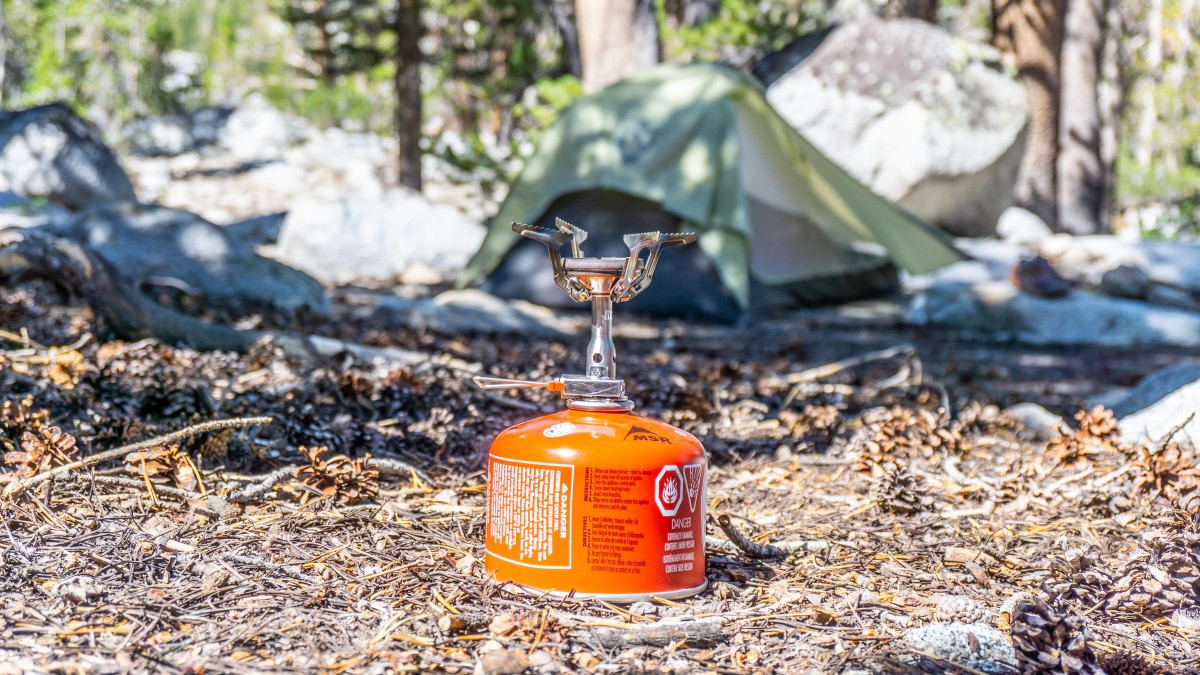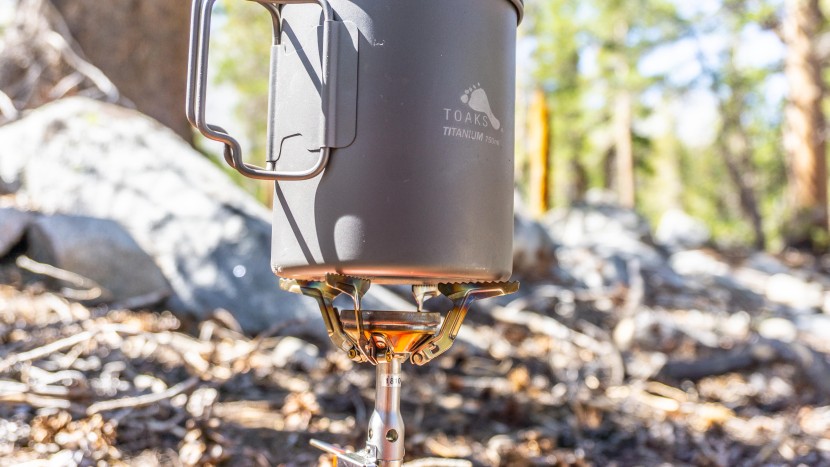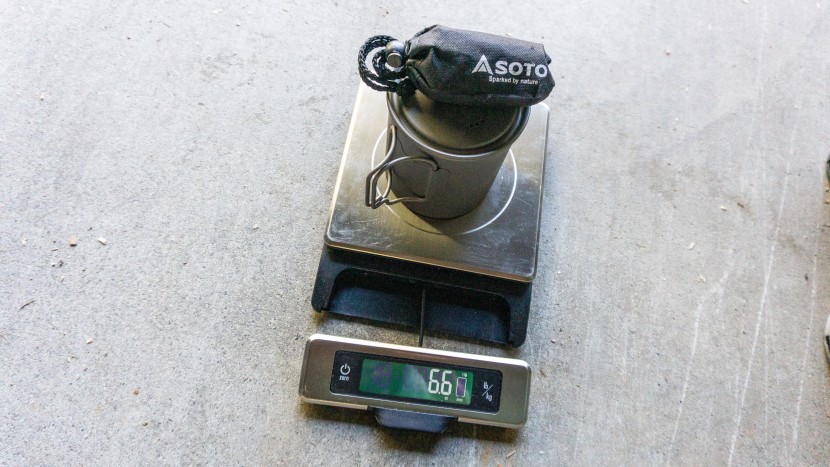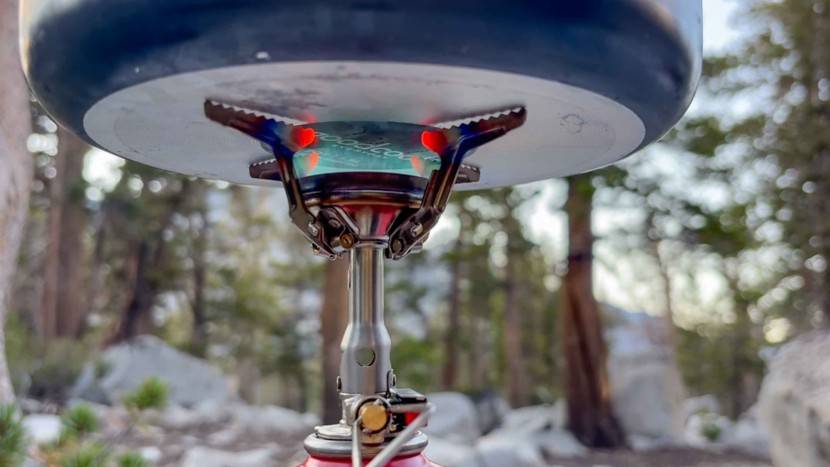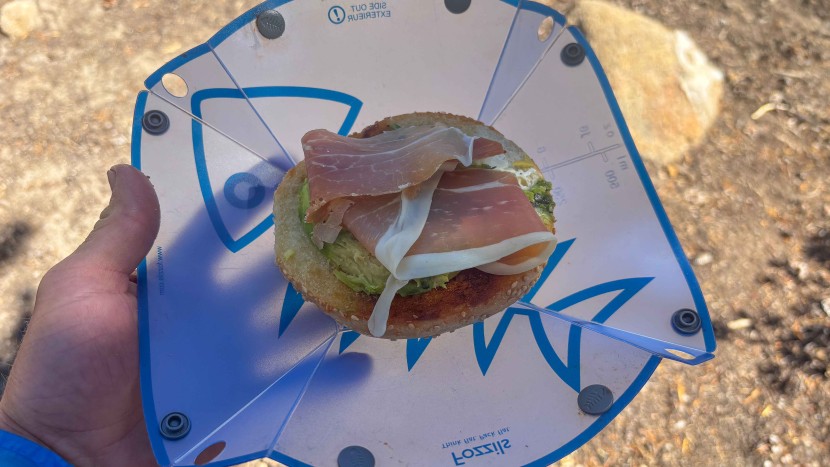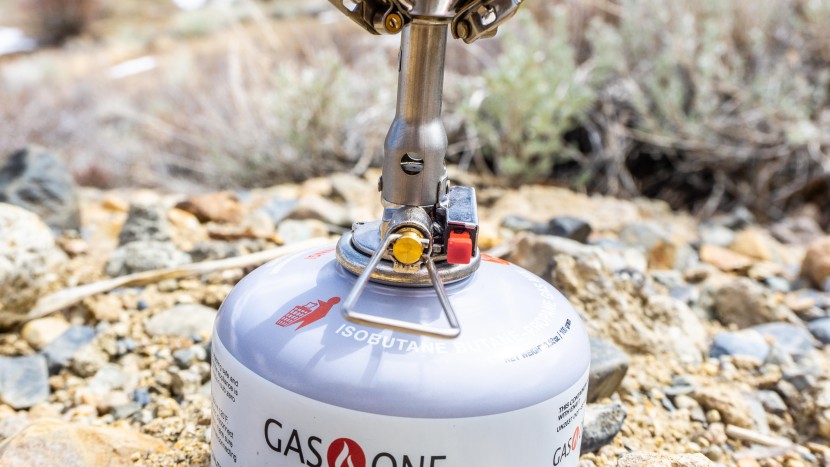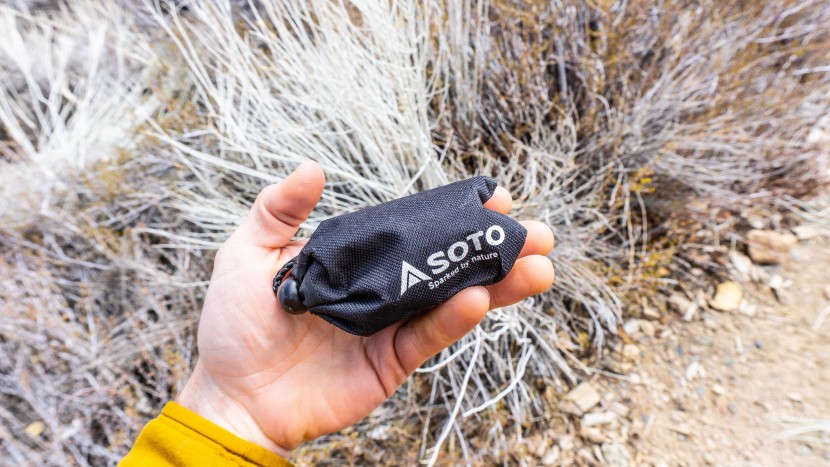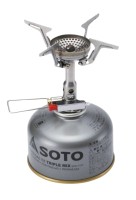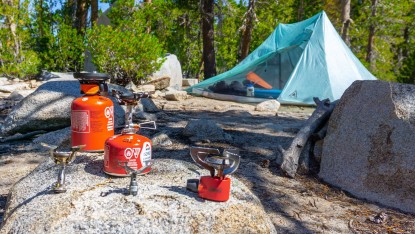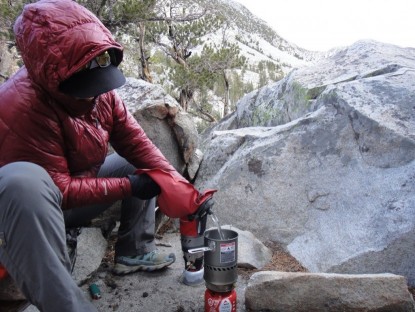
Our Verdict
Our Analysis and Test Results
The Soto Amicus is an impressive addition to a competitive field of canister stoves for backpacking. It is affordable, incredibly lightweight, and fairly fuel-efficient. The long fuel valve and push-button ignitor make it easy to use. The stove reliably produces a blue flame to ensure fast cooking temps, and the pot stabilizers provide sufficient support for smaller pots. Whether you're looking for your first backpacking stove or you're looking to shave some grams from your kit without sacrificing durability, this stove is a worthy contender.
Fuel Efficiency
The Amicus didn't top the charts in fuel efficiency, performing similarly to other lightweight canister stoves with limited heat retention from the burner to the pot. While it'll require bringing more fuel, this stove also offers great simmering if you want to make more involved meals in the backcountry.
The Amicus uses an average of .28 ounces of fuel per boil. During our field-testing trips, we never even came close to running out of fuel. While this is also due in part to planning, we found the Amicus to be a reliable stove for cooking quality meals without having to bring extra canisters into the backcountry. When things got a bit windy, we were mostly pleased with this stove's resilience, keeping our meals cooking and our water boiling without a substantial decrease in fuel efficiency. When utilizing a skillet, the Amicus also performed relatively efficiently
Weight
From the first time we took it out of the box, the Amicus wowed us with its dimensions and weight. This is a stove you can take for lengthy trips in the backcountry and are unlikely to even notice it on your back.
We used a titanium pot/lid combo from Toaks to measure essential weight (stove + pot). The Amicus weighed 6.6 ounces with the Toaks pot, and 3.6 ounces on its own. This is one of the lightest weights in our test.
Simmering Ability
The Amicus simmered quite well thanks to the long wire fuel valve, which allows you to dial down the burner to sustain a low enough flame to simmer without flickering out.
We were able to cook some incredible food, from quesadillas to crunch wrap supreme specials (a specialty of one of our gear testers). Many lightweight models don't have the same simmering capabilities as larger stoves, but the Amicus can keep up with the best of them.
Wind Resistance
If you're looking for a heavy-duty stove that can battle the winds, this is probably not our top recommendation. It has a small and exposed burner head that's relatively susceptible to wind. However, it was still competitive in scoring, thanks to decent performance in lighter winds.
In both lab and field testing, the Amicus performed well in friendlier wind conditions, with about a 20% reduction in fuel efficiency and a slight increase in boil times. However, it completely blew out with moderate to strong gusts, especially if we had the flames at lower settings for simmering. This is a stove that can still handle some wind; it'll just require a bit more thought with how the burner head is sheltered.
Ease Of Use
As a bare bones model, the Amicus is unlikely to cause confusion on your first camping trip. Simply take it out of the box, undo the legs, and attach it to the isobutane. While there were a few setbacks with the design, the Amicus held its own in the ease of use metric.
Overall, we found the Amicus to be user-friendly, with a simple, no-frills construction that was designed thoughtfully by Soto. The wire fuel valve is long enough that you can reach it without scalding your hands, should your pot boil over. The pot stabilizers rotate on a spring rivet and secure with a small metal tab and hook. Once in place, these feel secure, though the Amicus isn't the most sturdy option for larger pots of water or food. The piezo igniter worked most of the time, but we eventually resorted to using a lighter to ignite the Amicus. At the end of the day, this is an excellent lightweight stove, but it's important to not overload it with a heavy meal or a larger pot.
If you decide to travel with the stove's stuff sack, it is made out of a burly fabric that is burn-resistant enough that you can put a hot stove inside after a quick round of coffee (though we don't recommend testing it by sticking it in a fire). Remember that you'll need to supply your own lightweight cookware with this type of stove.
Should You Buy the Soto Amicus?
The Amicus is an affordable ultralight canister stove that is fairly fuel-efficient, easy to use, and boils quickly regardless of conditions. The pot stabilizers provide impressive stability for smaller loads, the ignitor lit the stove fairly consistently, and it commands minimal space in your pack. Can you find stoves that perform better in one of our metrics? Sure, but we haven't found any that perform as well across all metrics at such an affordable price.
What Other Backpacking Stoves Should You Consider?
If you're looking for an option that can handle a larger pot or pan, consider the big sibling of the Amicus, the Soto WindMaster. It weighs and costs more, but it performs better in the wind. If you need a stove that offers better fuel efficiency, consider the Jetboil Stash.
| Awards | Excellent Affordability |
|---|---|
| Price | $50 List |
Overall Score  |
|
| Star Rating | |
| Bottom Line | This lightweight option offers excellent simmering capabilities in an impressively low-priced package; we only wish it included a pot and lid |
| Pros | Incredible price, great simmering ability, decent weight, user-friendly |
| Cons | Smaller stabilizers for pots or pans, less durable, must buy pot separately |
| Rating Categories | Soto Amicus |
| Fuel Efficiency (25%) | |
| Weight (25%) | |
| Simmering Ability (20%) | |
| Ease of Use (15%) | |
| Wind Resistance (15%) | |
| Specifications | Soto Amicus |
| Weight | 3.6 oz |
| Type | Small canister |
| Fuel Type | Isobutane |
| Additional Included Items | Stuff sack |
| Piezo Igniter | Yes |
| Measured Essential Weight | 6.6 oz |
| Dimensions | 3.9" × 0.7" × 6.5" |
| Boil Time .5 liters | 3 min 41 sec |


